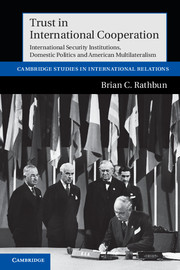 Trust in International Cooperation
Trust in International Cooperation Book contents
- Frontmatter
- Contents
- Preface
- 1 Circles of trust: reciprocity, community and multilateralism
- 2 Anarchical social capital: a social psychological theory of trust, international cooperation and institutional design
- 3 The open circle: the failure of the League of Nations
- 4 Squaring the circle: the birth of the United Nations
- 5 Closing the circle: the negotiation of the North Atlantic Treaty
- 6 Coming full circle: fear, terrorism and the future of American multilateralism
- Works cited
- Index
2 - Anarchical social capital: a social psychological theory of trust, international cooperation and institutional design
Published online by Cambridge University Press: 05 June 2012
- Frontmatter
- Contents
- Preface
- 1 Circles of trust: reciprocity, community and multilateralism
- 2 Anarchical social capital: a social psychological theory of trust, international cooperation and institutional design
- 3 The open circle: the failure of the League of Nations
- 4 Squaring the circle: the birth of the United Nations
- 5 Closing the circle: the negotiation of the North Atlantic Treaty
- 6 Coming full circle: fear, terrorism and the future of American multilateralism
- Works cited
- Index
Summary
Rationalists have difficulty accounting for multilateral cooperation because of their reliance on strategic trust. However, rationalism does not exhaust the varieties of trust, either theoretically or empirically. Social psychologists have centered their attention instead on generalized trust, a relatively optimistic view about the trustworthiness of others. Generalized trust is not tailored to individual circumstances or partners but serves as a general rule that guides behavior and choices about cooperation. The etymology of generalized trust is “A trusts” or “A is trusting.” Generalized trust allows for a more open community and reciprocity circle.
Generalized trust is not based on a naïve belief that all others are trustworthy. Rather it is a default tendency to trust, ceteris paribus, unless there is specific information indicating that this is not wise (Mercer 2005: 95; Yamagishi 2001: 124). Brewer calls it “depersonalized trust” (1981: 356). As such, generalized trust is not inconsistent with distrust of specific others who have proved themselves to be unreliable and dishonest partners. As Uslaner writes, “It is hardly contradictory for someone who places great faith in people to check out the qualifications and honesty of specific persons” (2002: 24). Nor is it a panacea. Even generalized trust might not promote cooperation if the costs of a breach of trust are dramatic. Vulnerability is not distrust.
- Type
- Chapter
- Information
- Trust in International CooperationInternational Security Institutions, Domestic Politics and American Multilateralism, pp. 24 - 56Publisher: Cambridge University PressPrint publication year: 2011


